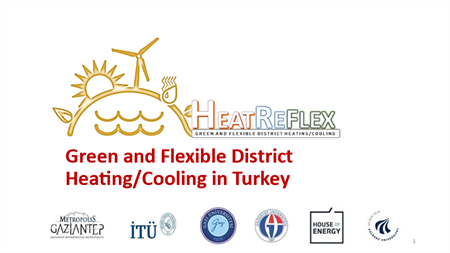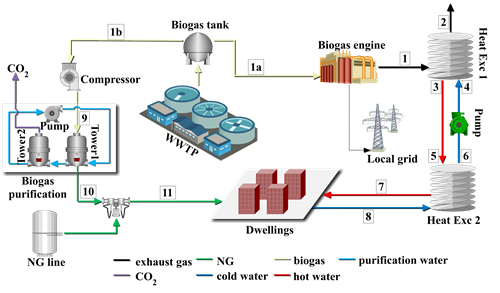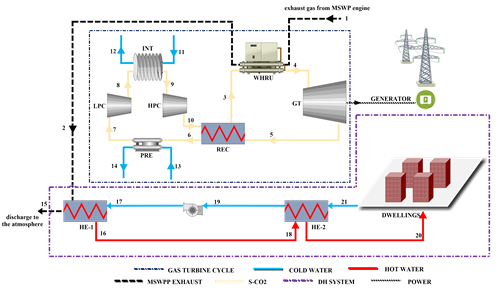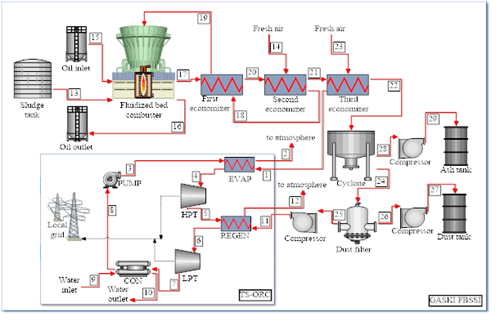by
Fırat Mehmet Günkan | Jan 12, 2022
Prof. Dr. Ayşegül ABUŞOĞLU focuses on an international project titled "HeatReFlex: Green and Flexible District Heating/Cooling in Turkey" in collaboration with Aalborg University, Danish Energy Agency, İTÜ, Gazi University, and Gaziantep Metropolitan Municipality. This project will lay the foundation for a future bottom-up energy system based on renewables, communities (from building-level up to cities and beyond), and flexibility providing better user motivation/engagement, stability, and transition to sustainability in Turkey to meet the climate commitments and improve economic competitiveness by employing the Danish experience on efficient heating technologies. The project will also develop a technical framework for optimal planning and operation of thermal energy devices and processes in small to large-scale energy communities supporting distributed heating/cooling generation, storage, conversion, and flexibility concerning the technical constraints, regulations, and policies. Within this project, heat-electricity nexus (such as converting excess electric power to heat), particularly when the electric balancing requirements become more stringent in the presence of variable renewables, will be studied. As the "HeatReFlex" project director of İTÜ leg, Prof. Dr. Ayşegül ABUŞOĞLU is researching on Waste-to-Energy based district heating and cooling scenarios and power production. With two separate research groups in the scope of the project, she is developing national inventories in addition to developing scenarios based on municipal solid waste, wastewater, sewage sludge, etc., for improving the country's current waste management. The works published in 2021 in scope of the project can be accessed from the following links
Prof. Dr. Ayşegül ABUŞOĞLU focuses on an international project titled "HeatReFlex: Green and Flexible District Heating/Cooling in Turkey" in collaboration with Aalborg University, Danish Energy Agency, İTÜ, Gazi University, and Gaziantep Metropolitan Municipality. This project will lay the foundation for a future bottom-up energy system based on renewables, communities (from building-level up to cities and beyond), and flexibility providing better user motivation/engagement, stability, and transition to sustainability in Turkey to meet the climate commitments and improve economic competitiveness by employing the Danish experience on efficient heating technologies. The project will also develop a technical framework for optimal planning and operation of thermal energy devices and processes in small to large-scale energy communities supporting distributed heating/cooling generation, storage, conversion, and flexibility concerning the technical constraints, regulations, and policies. Within this project, heat-electricity nexus (such as converting excess electric power to heat), particularly when the electric balancing requirements become more stringent in the presence of variable renewables, will be studied. As the "HeatReFlex" project director of İTÜ leg, Prof. Dr. Ayşegül ABUŞOĞLU is researching on Waste-to-Energy based district heating and cooling scenarios and power production. With two separate research groups in the scope of the project, she is developing national inventories in addition to developing scenarios based on municipal solid waste, wastewater, sewage sludge, etc., for improving the country's current waste management. The works published in 2021 in scope of the project can be accessed from the following links:
1. District heating and electricity production based on biogas produced from municipal WWTPs in Turkey: A comprehensive case study, Energy, Vol. 223, May 2021, ISSN: 0360-5442 (10.1016/j.energy.2021.119904)
ABUŞOĞLU AYŞEGÜL, TOZLU ALPEREN, ANVARI-MOGHADDAM AMJAD
2. Municipal solid waste-based district heating and electricity production: A case study, Journal of Cleaner Production, February 2021, ISSN: 0959-6526 ( 10.1016/j.jclepro.2021.126495)
TOZLU ALPEREN, ABUŞOĞLU AYŞEGÜL, ÖZAHİ EMRAH, ANVARI-MOGHADDAM AMJAD
3. A comparative thermoeconomic analysis and optimization of two different combined cycles by utilizing waste heat source of an MSWPP, Energy Conversion and Management, Vol. 228, January 2021, ISSN: 0196-8904 ( 10.1016/j.enconman.2020.113583)
ÖZAHİ EMRAH, ABUŞOĞLU AYŞEGÜL, TOZLU ALPEREN
4. Advanced Exergy Analysis of Waste‐Based District Heating Options through Case Studies, Energies, Vol. 14, August 2021, ISSN: 1996-1073 (10.3390/en14164766)
ÖZCAN HÜSEYİN GÜNHAN, HEPBAŞLI ARİF, ABUŞOĞLU AYŞEGÜL, ANVARI-MOGHADDAM AMJAD
5. Comparison of five developed power cycles in the frame of waste heat recovery, The International Journal of Materials and Engineering Technology, Vol. 4, May 2021, s. 1-9, ISSN: 2667-4033
TOZLU ALPEREN, ABUŞOĞLU AYŞEGÜL, ÖZAHİ EMRAH
6. İstanbul Büyükşehir Belediyesi Katı Atık Yakma ve Enerji Üretim Tesisinin Termodinamik Değerlendirmesi
ULIBTK'21 - Uluslararası Katılımlı 23. Isı Bilimi ve Tekniği Kongresi, 8 Eylül 2021
ABUŞOĞLU AYŞEGÜL, YILDIZHAN MUSTAFA, ÖZMEN BATUHAN H., YILMAZ GÖKAY



